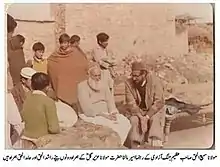Uzair Gul Peshawari
Uzair Gul Peshawari (1886 – 17 November 1989) was an Islamic scholar and an Indian freedom struggle activist who actively participated in the Silk Letter Movement.[2]
Mawlāna Uzair Gul Peshawari | |
|---|---|
 Sami-ul-Haq (right) with Uzair Gul Peshawari | |
| Personal | |
| Born | 1886 |
| Died | 17 November 1989 (aged 102–103) |
| Religion | Islam |
| Nationality | |
| Spouse | Beatrice Cooke |
| Parents |
|
| Alma mater | Darul Uloom Deoband |
| Known for | Silk Letter Movement |
| Muslim leader | |
| Disciple of | Mahmud Hasan Deobandi [1] |
Biography
Gul hailed from Ziarat Kaka Sahib, a town located in Peshawar.[3] He completed his primary studies with local teachers and moved to Darul Uloom Deoband, where he studied with Mahmud Hasan Deobandi.[4]He graduated from Darul Uloom in 1331 A.H.[3] During Khilafat Movement, Gul was made the president of Khilafat Committee in Deoband.[3] He was a close companion of Mahmud Hasan Deobandi and was imprisoned along with him in Malta for his role in the Silk Letter Movement.[5]
He served as a teacher at Darul Uloom Deoband[6] and before World War II, he was appointed as a head-teacher in Madrasa Rahmania in Roorkee.[3]
In 1945, Gul moved to his native place in Peshawar along-with his English wife Beatrice Cooke.[7]
Gul died on 17 November 1989. [8]
Family
Gul's first wife was a daughter of Mahmud Hasan Deobandi's niece.[4][6] During his stay at Roorkee, he married a new Muslim English woman named Beatrice Cooke.[6][3][7] Gul's second wife Cooke also wrote an English translation of Quran which remains unpublished.[4]
Legacy
- At University of Peshawar, Murad Ali Shah wrote a Master of Arts thesis entitled Mawlāna Uzair Gul-The Prisoner of Malta.[9]
- At University of Islamabad, Farzana Nisar wrote a Master of Philosophy thesis entitled Mawlāna Uzair Gul (Aseer-i-Malta): His Life and Achievements.[10]
References
- Marwat, Fazal-ur-Rahim Khan (1997). The evolution and growth of communism in Afghanistan, 1917-79: an appraisal. ISBN 9789694072210. Retrieved 19 August 2020.
- Agha Shorish Kashmiri. ابو الکلام آزاد: سوانح و افکار [Abul Kalam Azad : Life and Thoughts] (in Urdu) (June 2009 ed.). Lahore: Matbu'at-e-Chattan. p. 119.
- Rizwi, Syed Mehboob. Tārīkh Darul Uloom Deoband [History of the Dar al-Ulum Deoband]. 2. Translated by Murtaz Husain F Quraishi (1981 ed.). Deoband: Darul Uloom Deoband. pp. 83–84.
- Muhammad Miyan Deobandi. "Mawlāna Uzair Gul". Asiran-e-Malta [Prisoners of Malta] (in Urdu) (January 2002 ed.). Deoband: Naimia Book Depot. pp. 367–376.
- Asir Adrawi. Hazrat Shaykh al-Hind: Hayāt awr Karname [Shaykh al-Hind: Life and works] (in Urdu) (April 2012 ed.). Deoband: Shaykh al-Hind Academy, Darul Uloom Deoband. p. 178.
- Asir Adrawi. "Mawlāna Uzair Gul Peshawari". Tazkirah Mashāhīr-e-Hind: Karwān-e-Rafta (in Urdu) (2nd, April 2016 ed.). Deoband: Darul Moallifeen. pp. 195–196.
- Butt, John (16 March 2020). A Talib's Tale: The Life and Times of a Pashtoon Englishman. ISBN 9789353058029. Retrieved 18 August 2020.
- Zahidur Rashidi (December 1989). "Hadhrat Mawlana Uzair Gul". Monthly Al-Sharia (in Urdu). Retrieved 18 August 2020.
- Dr. Abdul RAUF, PAN-ISLAMISM AND THE NORTH WEST FRONTIER PROVINCE OF BRITISH INDIA (1897-1918) (PDF), p. 37, retrieved 18 August 2020
- "Maulana Uzair Gul (Aseer-i-Malta): his life and achievements (1886-1989)". opac.iiu.edu.pk. University of Islamabad. Retrieved 18 August 2020.